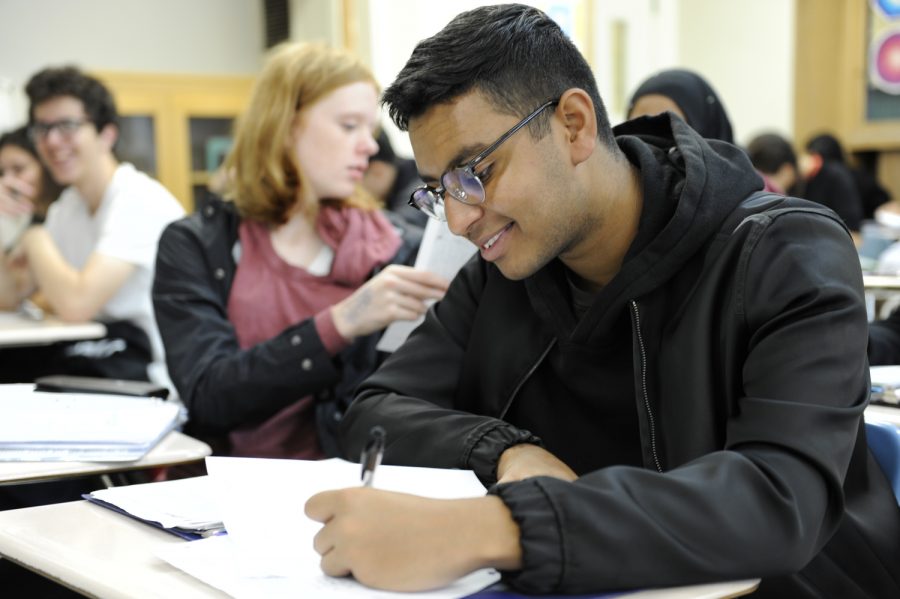Resources Available to Avoid Stress at Bronx Science
Students working tirelessly in a mathematics classroom.
The Bronx High School of Science, minutes before first period. Students swarm the staircases, rushing to get to their classes and talking to their friends before the school day commences. Countless others line the hallways on every floor, hunched over their notebooks as they race against the clock to finish their homework before the bell rings.
This experience – the frantic push before class and the last-minute homework completion – is certainly not unique to Bronx Science. In recent years, the pressure on high school students has increased substantially. Acceptance rates to elite colleges have gradually decreased, and the importance of standardized testing has risen in turn. As a result, students have had to up the ante by taking on more and more extracurricular activities and test prep. Due to their busy schedules, many teens have trouble completing their assignments on time or at all.
Academic stress carries many immediate consequences, but a 2015 survey headed by Dr. Naomi Leonard, a senior faculty member at NYU’s Nursing School, found that chronic stress in high school has consequences that can last a lifetime. Among the many detrimental long-term effects of stress are a higher risk of mental illnesses, including anxiety and depression, and academic disengagement. Unlike sleep deprivation or headaches, these are conditions that could plague afflicted students for the rest of their lives.
With the threat of these serious consequences looming large, it is essential that students are given ample opportunity to destress and are offered adequate resources to handle their challenging workloads. So what policies would Bronx Science students like to see implemented to alleviate stress?
Many students have suggested lowering the amount of homework assigned nightly, or assigning larger projects while allowing students more time to complete them. But there does not seem to be a common view of the correct level of homework among the faculty and as a result, an across-the-board policy seems difficult to enact, given the variety of academic disciplines and breadth of courses on offer.
Instead, policies such as no homework over breaks have been put into place, which is most welcome. However, this policy only apply for about three and a half weeks during the school year, leading some students to feel that stress is still an issue during the rest of the academic year. As a consequence, the student body has looked for answers elsewhere.
One alternative solution is found in our numerous in-school resources to combat stress. The S.O. hosts many de-stressing events throughout the year for each grade level, ranging from the ‘Fresh and Fringle’ to the Senior Scream, along with several Mental Health Weeks each year. Some students would like to see different types of events and opportunities, however. Maya Schuchert ‘20 said, “I really like the Mental Health Week fair, but I feel like there should be other mental health related activities to do as well.” Students should know about the school’s resident social worker, Mr. Cogliano, who provides guaranteed confidentiality for those who seek help.
“I get really stressed out too, and it’s hard to deal with that. But a really good way to try and fix it is to talk to the S.O. and tell us what would help your situation, because we promise we’ll try and make it happen,” said Ayesha Khan ‘20.
Ayesha Khan ‘20, who has been a member of the S.O. since her freshman year at Bronx Science, noted that, “The SO isn’t just there to plan events, though that’s what most people might think.” Stepping briefly out of her ninth period Cabinet meeting, she encouraged more input from students. “For the students who aren’t satisfied with what we’re doing, please send us an e-mail and let us know what you want the S.O. to do instead. We exist to help the student body achieve what they want to achieve.”
When asked about her opinion on school stress, Khan said, “I get really stressed out too, and it’s hard to deal with that. But a really good way to try and fix it is to talk to the S.O. and tell us what would help your situation, because we promise we’ll try and make it happen.”
Gazi Fuad is a Chief Photographer & Photo Editor for the school yearbook ‘The Observatory.’ Outside of school, he is part of a team of photographers....

